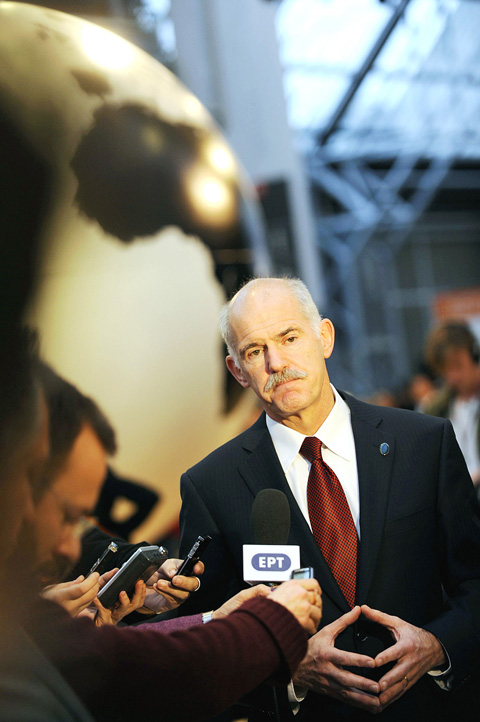Arsonists attacked offices of Greece’s ruling Socialist Party in Athens on Friday as the country suffered a new credit blow ahead of a parliament debate on how to confront its massive debt.
Credit rating agency Standard and Poor’s downgraded two Greek banks and put two others on negative watch. International ratings agencies have delivered a series of heavy blows to Greece’s standing in recent weeks.
Greek Prime Minister George Papandreou has ordered major austerity measures to cut Greece’s 300 billion euro (US$436 billion) debt that has roiled markets and pushed down the euro currency, which Greece shares as a member of the eurozone.

PHOTO: AFP
The attacks on the six Socialist Party offices in Athens came hours after a day of protests by communist-led unions against the austerity measures.
DOWNGRADE
Markets were jolted meanwhile by a new credit downgrade.
Standard and Poor’s cut Eurobank and Alpha Bank to BBB from BBB-plus and placed National Bank of Greece, the country’s biggest private institution, and Bank of Piraeus, its fifth biggest, on negative watch.
S&P downgraded Greek sovereign debt on Wednesday, and Moody’s is expected to issue a judgement by Christmas after warning Greece in October that its grade could be cut.
Papandreou hit out at the power wielded by the agencies and said France and Spain would support him in the matter.
“The Spanish prime minister, for example, says agencies which answer to no one should not be able to make economies rise and fall ... this is not possible in a democratic country with a government elected on a clear program,” ANA quoted Papandreou as saying.
Speaking to reporters in Copenhagen, where he was attending the UN climate change conference, Papandreou said he expected Spanish Prime Minister Jose Luis Rodriguez Zapatero to make the agencies an issue during Spain’s European presidency, which begins next month.
Papandreou also mentioned French President Nicolas Sarkozy.
“He said the agencies which are rating us are the same ones that gave A grades to banks that collapsed the next day,” Papandreou said.
The interest rate which Greece has to pay to attract international savings to finance its overspending, via the bond market, has shot up in recent weeks and is now about twice the rate Germany has to pay.
CREDIBILITY
Greek Finance Minister George Papaconstantinou has just been on a three-day tour of European capitals seeking to salvage Greece’s financial credibility.
He was to lead the Socialist government’s call at a parliament debate yesterday for radical spending cuts to curb the debt and a deficit estimated at 12.7 percent of output.
The government’s targeted cuts already go beyond the planned deficit reduction of 3.6 percent included in next year’s budget.
The finance minister reaffirmed that he wants a bigger cut, saying he was aiming for a “more ambitious reduction” close to 4 percent.
European Central Bank (ECB) Vice President Lucas Papademos meanwhile urged Greek authorities to take “courageous” measures to tackle the swollen fiscal deficit.
Papademos, himself a Greek, said: “These measures would need to be decisive, substantial, and given the magnitude of the problem ... they would have to be courageous.”
Speaking at the ECB’s twice-yearly Financial Stability Review, Papademos further stressed that Britain, Ireland, Spain and the US also had large deficits and that “the issue is really global.”

In Italy’s storied gold-making hubs, jewelers are reworking their designs to trim gold content as they race to blunt the effect of record prices and appeal to shoppers watching their budgets. Gold prices hit a record high on Thursday, surging near US$5,600 an ounce, more than double a year ago as geopolitical concerns and jitters over trade pushed investors toward the safe-haven asset. The rally is putting undue pressure on small artisans as they face mounting demands from customers, including international brands, to produce cheaper items, from signature pieces to wedding rings, according to interviews with four independent jewelers in Italy’s main

Japanese Prime Minister Sanae Takaichi has talked up the benefits of a weaker yen in a campaign speech, adopting a tone at odds with her finance ministry, which has refused to rule out any options to counter excessive foreign exchange volatility. Takaichi later softened her stance, saying she did not have a preference for the yen’s direction. “People say the weak yen is bad right now, but for export industries, it’s a major opportunity,” Takaichi said on Saturday at a rally for Liberal Democratic Party candidate Daishiro Yamagiwa in Kanagawa Prefecture ahead of a snap election on Sunday. “Whether it’s selling food or

CONCERNS: Tech companies investing in AI businesses that purchase their products have raised questions among investors that they are artificially propping up demand Nvidia Corp chief executive officer Jensen Huang (黃仁勳) on Saturday said that the company would be participating in OpenAI’s latest funding round, describing it as potentially “the largest investment we’ve ever made.” “We will invest a great deal of money,” Huang told reporters while visiting Taipei. “I believe in OpenAI. The work that they do is incredible. They’re one of the most consequential companies of our time.” Huang did not say exactly how much Nvidia might contribute, but described the investment as “huge.” “Let Sam announce how much he’s going to raise — it’s for him to decide,” Huang said, referring to OpenAI

Nvidia Corp’s negotiations to invest as much as US$100 billion in OpenAI have broken down, the Wall Street Journal (WSJ) reported, exposing a potential rift between two of the most powerful companies in the artificial intelligence (AI) industry. The discussions stalled after some inside Nvidia expressed concerns about the transaction, the WSJ reported, citing unidentified people familiar with the deliberations. OpenAI makes the popular chatbot ChatGPT, while Nvidia dominates the market for AI processors that help develop such software. The companies announced the agreement in September last year, saying at the time that they had signed a letter of intent for a strategic